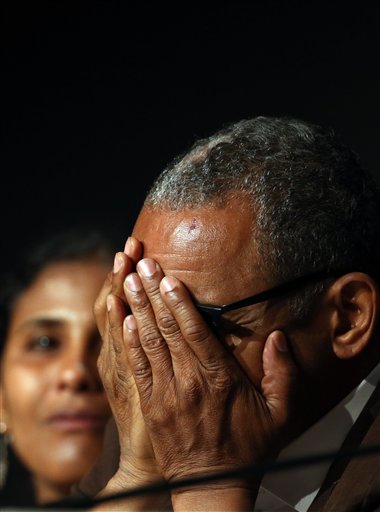
By THOMAS ADAMSON
Director Abderrahmane Sissako holds his hands over his face while answering a question during a press conference for Timbuktu at the 67th international film festival, Cannes, southern France, Thursday, May 15, 2014. (AP Photo/Alastair Grant)
CANNES, France (AP) — It was all too much for the director of “Timbuktu,” a touching humanist account of the jihadist takeover of Northern Mali in 2012. Abderrahmane Sissako broke down in tears at a Cannes press conference as he described his film’s depiction of brutal Islamist law that shattered the lives of innumerable families.
“It’s difficult… We become more and more indifferent to the horrors if we’re not careful,” said Sissako, at times clutching his head in his hands with his voice trailing off.
The wounds from the Mali conflict — which made headlines in 2012-13 after the French army intervened to oust foreign Islamists — are clearly still fresh. And the award-winning director’s film — competing for this year’s Palme d’Or — is the world’s first to look at the dramatic jihadist takeover of the city of Timbuktu.
Though there is plenty of drama in the realities of the unrest which ended with France’s Operation Serval, Sissako’s understated film gains real emotional power from its lack of hyperbole and sense of silent struggle.
Mauritania-born Sissako focuses on the break-up of a close-knit Tuareg cattle-herding family: the consequences, when the family father, Kidane (played mesmerically by first-time actor Ibrahim Ahmed), shoots a fisherman dead in a lake by accident. The sequence, handled silently in one slow-paced long shot, is one of the most powerful.
The peripheral story lines are just as impactful. Punishments handed out by the hardline rulers to Timbuktu residents for playing music or even soccer are stonings, executions and lashings. Again, Sissako’s handling of them in an almost matter-of-fact way serves to shock even more.
But what stops this film from drowning in its own sorrows is its humor.
Jihadists battle with dodgy cell phone signals, or aggressively debate the merits of French soccer star Zinedine Zidane. Elsewhere, in another of the movie’s stand-out scenes young boys get round Shariah restrictions on football by playing with an imaginary ball.
“In every being there is a complexity, there is the good and the bad. A jihadist is someone we can see ourselves in,” said Sissako.
The project — a labor of love — was clearly a brave film to make. The logistics of getting this film made were almost tougher than the artistic considerations.
Sissako planned to film in Mali but had to cancel this following a flare in violence in September 2013. The government of his home country, neighboring Mauritania, luckily stepped in and provided a secure safe haven there for the crew to film. Sissako admits that there were still big risks to filming there.
Sissako, however, doesn’t like his film being called “brave.”
“The really courageous people are those that have lived it,” he said.
___
Thomas Adamson can be followed at http://Twitter.com/ThomasAdamsonAP



